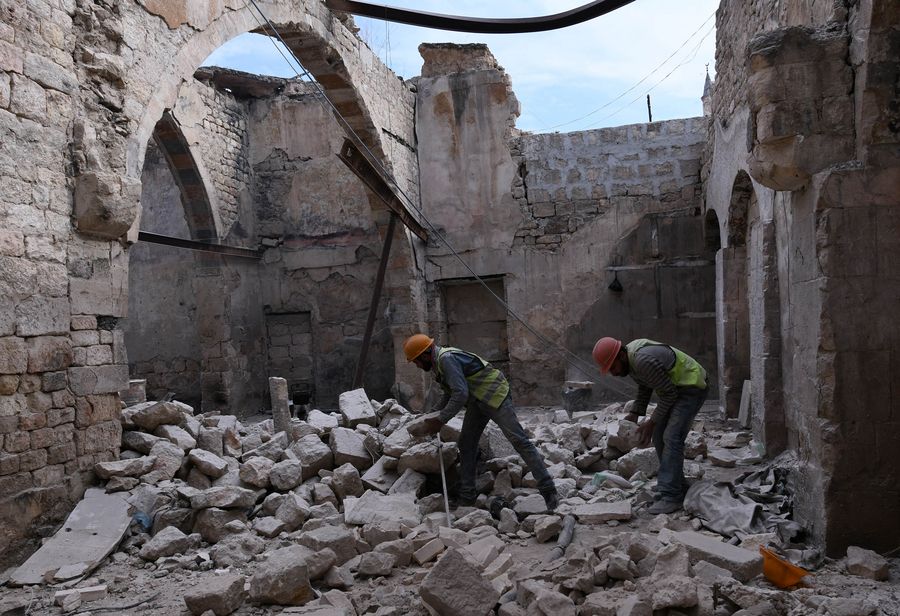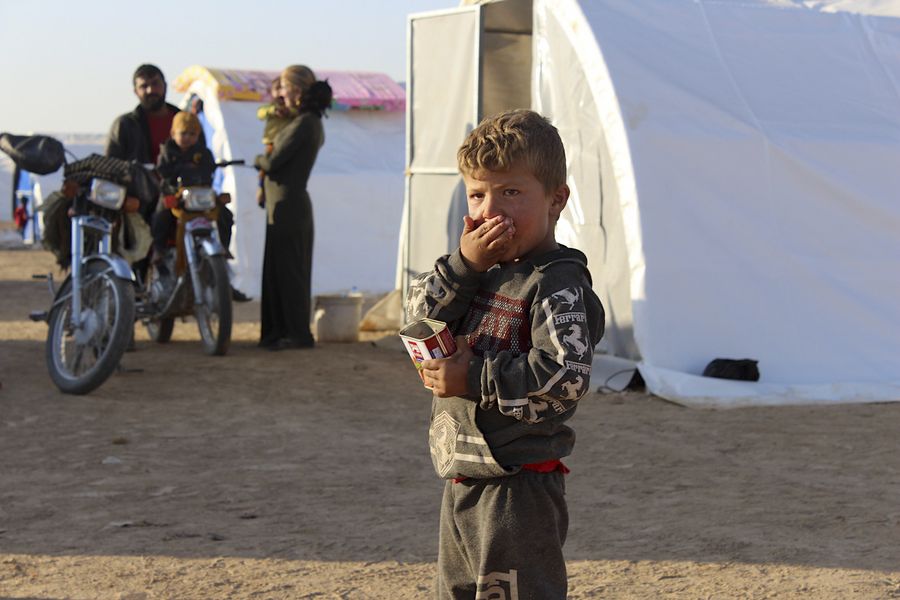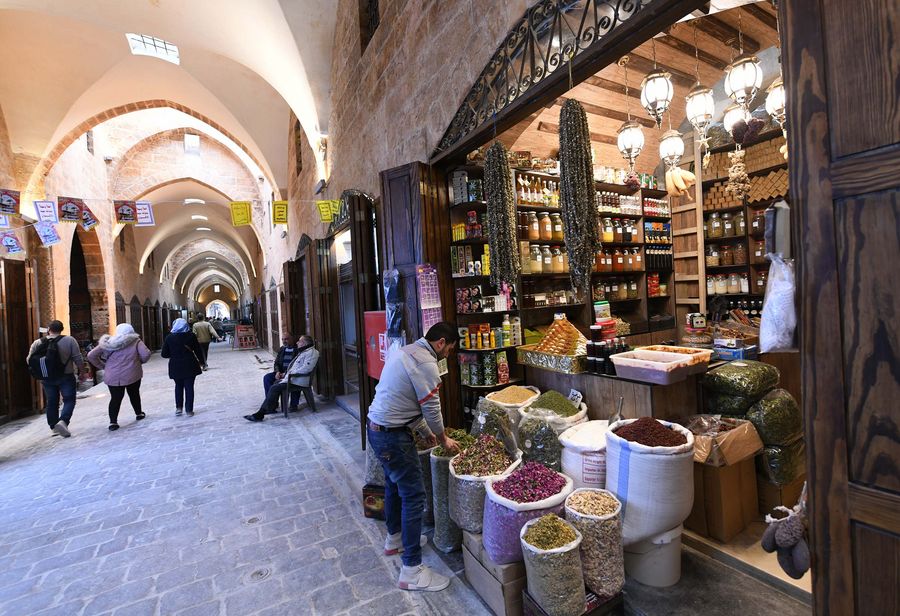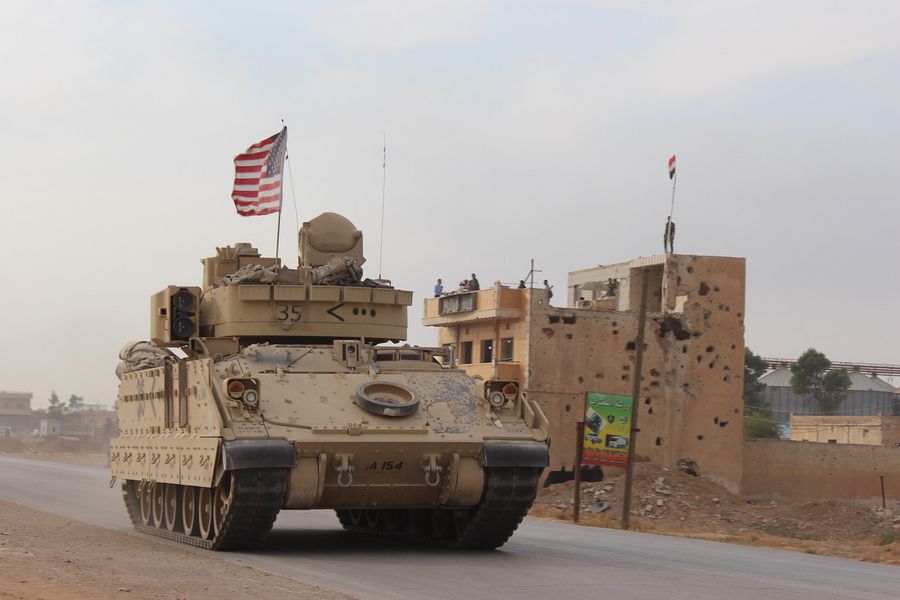
Workers rebuild the Khabiya souk (market) in old Aleppo City, north Syria, on Nov. 24, 2019. (Xinhua/Ammar Safarjalani)
Since a civil war broke out more than eight years ago, Syrian pound has hit lowest against U.S. dollar in the black market, 800 pound for one dollar, amid skyrocketing food prices and sluggish foreign investment.
DAMASCUS, Dec. 1 (Xinhua) -- The economic hardships in Syria are increasing with the skyrocketing prices of food items as the Syrian pound has reached the lowest against the U.S. dollar in the black market since a civil war broke out more than eight years ago.
The pound is now sold in the black market at 800 for one dollar, the lowest exchange rate since the beginning of the Syrian war amid high demands and low supplies of the dollar.
To cope with the situation, Syrian President Bashar al-Assad recently ordered a pay rise of up to 50 percent for both state employees and the retirees.
However, this increase is far from meeting the demands of the average Syrian family as a result of commodities' high prices and the sharp decline in the Syrian currency's value.
The Syrian Ministry of Supply and Internal Trading started sending patrols to the marketplaces in the capital Damascus to monitor the prices of food items and to impose penalties on the shop owners who are not abiding by the prices set by the ministry.

A Syrian boy eats canned food in a refugee camp in the countryside of Hasakah City, Syria, on Nov. 21, 2019. (Xinhua/Str)
It also launched a 24-hour hotline to receive the complaints of citizens against the shops that sell at high prices.
Many shops were ordered to close by the authorities for violating the price range while others were fined for selling the products as per the U.S. dollar's exchange rate in the black market.
Notably, the prices of the commodities have increased 10 folds since the beginning of the Syrian war.
The worsening situation comes as the cold weather has started in Syria and people will have to deal with the issue of securing the diesel for heaters and cooking gas.
Observers believe the depreciation of the Syrian pound is generally caused by the tightened Western sanctions on the country, but the recent unprecedented hike results from the situation in neighboring Lebanon.
In an interview with the French Paris Match Magazine published on Thursday, Syrian President Bashar al-Assad said the foreign investments in Syria are hindered by the Western sanctions.

A vendor arranges goods at the al-Saqatiyah souk (market) in Aleppo City, north Syria, on Nov. 24, 2019. (Xinhua/Ammar Safarjalani)
"In the past six months, some companies started to invest in Syria. Of course, foreign investment remains slow under these circumstances, but there are ways to circumvent the sanctions, and we have started to engage with these companies," al-Assad said.
"But this doesn't mean that the investment and reconstruction process is going to be quick," he noted, adding it will take years to rebuild the country and the economy.
Throughout the Syrian war, all land border crossings of Syria were closed such as those with Iraq, Turkey, and Jordan.
The border crossings with Lebanon were Syria's window to the world, as most of the Syrians' travel movements are processed through Lebanon's Rafik Hariri International Airport when most flights to Damascus were halted.
Besides, many goods were imported into Syria through Lebanon.

A U.S. military vehicle runs past the Tal Tamr area in the countryside of Hasakah province, northeastern Syria, on Nov. 14, 2019. (Xinhua/Str)
Thus, the current upheaval in Lebanon, which has lasted more than one month, is being felt in Syria.
Maher Ihsan, a Syrian expert, told Xinhua that the deteriorating situation in Lebanon has largely affected Syria as the majority of the Syrian businessmen have accounts in Lebanese banks.
"Most of the traders have accounts in Lebanon and because of the protests and tough economic situation in Lebanon, the accounts are largely frozen and people cannot withdraw money," he said.
This situation "pushed the traders to ask for dollars from the government here to keep their jobs running and this has caused a problem in securing the dollar," Ihsan added. ■



